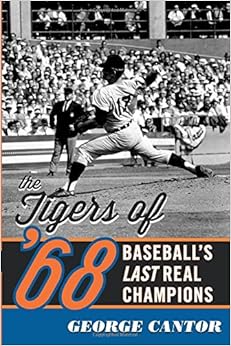The year 1968 was a turbulent one in the U.S. It was a year of assassination, a year of violent demonstrations at the Democratic National Convention in Chicago and yet another year of war in Vietnam. Yet it was also one of the best years of my life, the year I married my true love, the year I moved to a new town and started a new job where I would stay for the rest of my career and the year my team, the Detroit Tigers, won the World Series.
So there was no way, almost 49 years later, I was not going to enjoy reading The Tigers of '68: Baseball's Last Real Champions by George Cantor. What I didn't expect was how terrific this book, published in 1997 and reprinted in 2014, would be. In just 230 pages of brilliant prose, Cantor covers not just a great team but also those turbulent times in which the Tigers roared.
Race riots in Detroit in 1967 left the once-great city in ruins. Much of the white population fled to the suburbs. It has been said that the 1968 Tigers saved the city, but that is not quite true, for a half century later Detroit has still not recovered. But they certainly helped, uniting fans, both black and white, at least for those few months.
Cantor did not spend much of his journalistic career as a baseball writer, but he did cover the Tigers for the Detroit Free Press (after Brent Musberger declined the job) in 1968. But then a strike kept the Detroit papers closed for much of the summer, and it took awhile for enthusiasm for the team to build and attendance to pick up.
The author's coverage takes readers from spring training that year to the seventh game of the World Series, where Mickey Lolich bested Bob Gibson of the St. Louis Cardinals. Yet he also seeks out many of the players from that team, including Lolich, Earl Wilson, Willie Horton, Bill Freehan, Gates Brown, Al Kaline and John Hiller, many of whom in the mid-'90s still lived in the Detroit area, and asked them to reflect on that team and their lives after baseball. These interviews alone make the book worth reading.
So what is the meaning of Cantor's subtitle, "Baseball's Last Real Champions"? Mostly it is a commentary on the fact that Major League Baseball went to a playoff system in 1969, meaning that a team now doesn't necessarily have to have the best record in its league to get into the Series. Yet so much else has changed with baseball since 1968, including salaries, free agency, the designated hitter and the way pitchers are used. In 1968 Tiger pitchers had 59 complete games, including 28 by Denny McClain, who won a mind-boggling 31 games. Last year the pitching staff had just three complete games.
Furthermore, all the World Series games were still played during the day that year, and the seventh game took just two hours and seven minutes. Today Series games can take twice that long and are all played at night, meaning that many fans, especially children, never get to watch the ninth innings of most games.
To love this book, it helps to have been a Tiger fan in 1968, but it certainly isn't necessary.

No comments:
Post a Comment